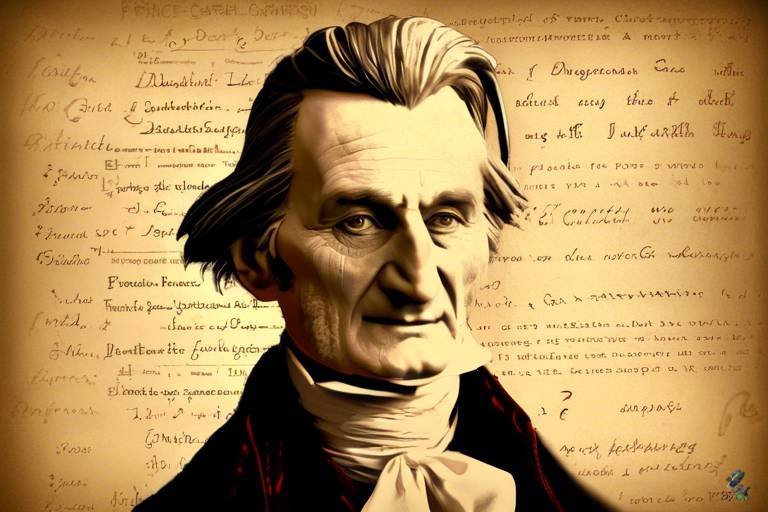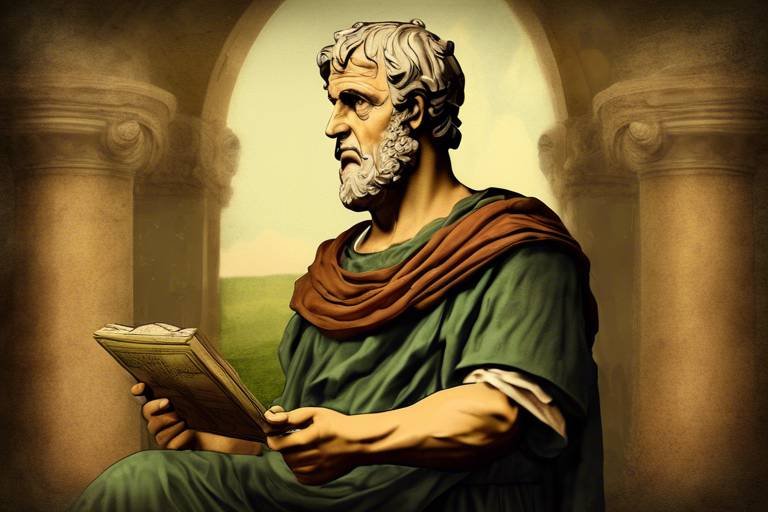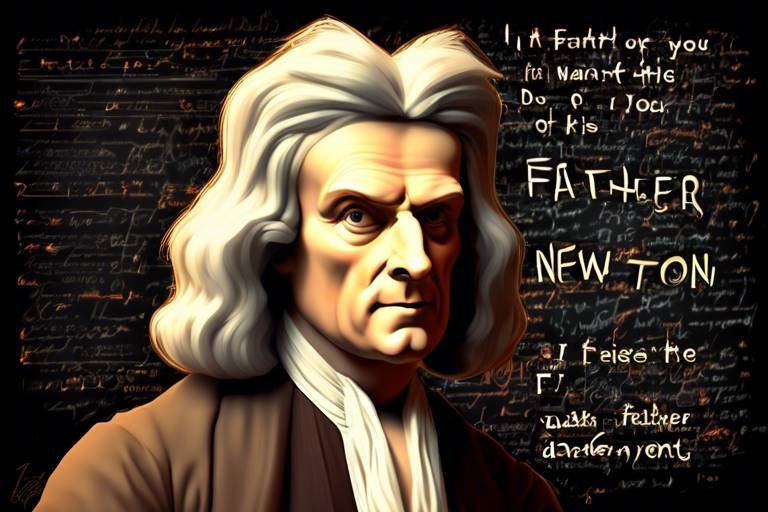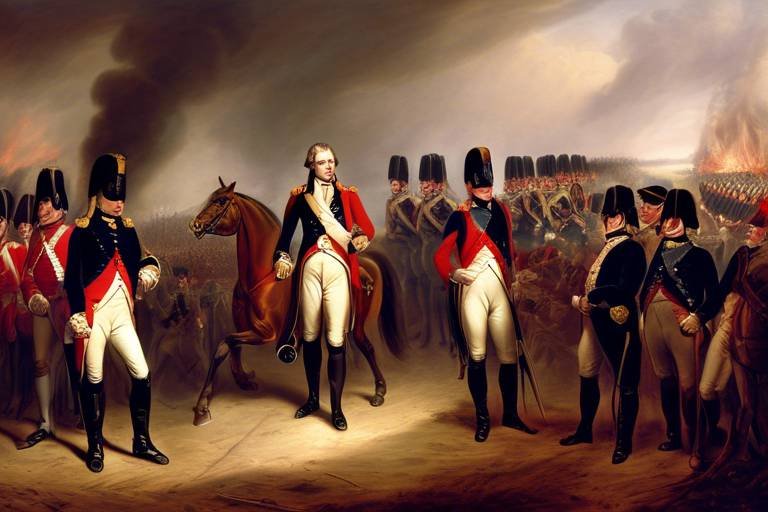Carl Friedrich Gauss: The Prince of Mathematicians
Carl Friedrich Gauss, often referred to as the Prince of Mathematicians, was a brilliant mind whose work revolutionized various branches of mathematics. Born in 1777 in the Duchy of Brunswick-Wolfenbüttel, Germany, Gauss displayed exceptional mathematical abilities from a young age. Despite his humble beginnings, he went on to become one of the most influential mathematicians in history, leaving a lasting impact on the field.

Early Life and Education
Exploring the life, contributions, and legacy of the renowned mathematician Carl Friedrich Gauss, known for his groundbreaking work in number theory, algebra, statistics, and more.
Discovering Gauss's humble beginnings, early education, and the remarkable mathematical talent that emerged during his formative years.
Carl Friedrich Gauss, born on April 30, 1777, in Brunswick, Germany, displayed exceptional mathematical abilities from a young age. Despite his family's modest background, Gauss's innate talent for numbers quickly became evident. His early education was marked by self-study and a voracious appetite for mathematical challenges, setting the stage for his future as a mathematical prodigy.
At the age of 7, Gauss amazed his teachers by quickly solving complex arithmetic problems, foreshadowing his future as a mathematical genius. Recognizing his extraordinary potential, his teachers and mentors provided him with opportunities to further develop his skills, laying the foundation for his remarkable career in mathematics.
By his teenage years, Gauss had already made significant mathematical discoveries, including his construction of a regular 17-sided polygon using only a compass and straightedge—a feat previously thought impossible. His innovative approach to geometry and problem-solving set him apart as a young scholar with immense promise.
Despite facing personal hardships and financial challenges during his early years, Gauss's unwavering dedication to mathematics propelled him forward. His thirst for knowledge and relentless pursuit of excellence distinguished him as a true mathematical prodigy, shaping the trajectory of his future achievements.
Delving into Gauss's significant contributions to various fields, including his work on number theory, differential geometry, and the development of the Gaussian distribution.
Exploring Gauss's pioneering advancements in number theory, such as his work on modular arithmetic, quadratic reciprocity, and the prime number theorem.
Examining Gauss's impact on geodesy and astronomy through his development of the method of least squares, his work on planetary orbits, and his contributions to cartography.
Reflecting on the enduring legacy of Gauss in the world of mathematics, his influence on future generations of mathematicians, and the continued relevance of his work today.
Analyzing the fundamental mathematical principles and methodologies that Gauss pioneered, which continue to shape modern mathematical thinking and problem-solving strategies.
Highlighting the numerous accolades, awards, and honors bestowed upon Gauss during his lifetime and posthumously, recognizing his unparalleled contributions to the field of mathematics.

Mathematical Achievements
Exploring the life, contributions, and legacy of the renowned mathematician Carl Friedrich Gauss, known for his groundbreaking work in number theory, algebra, statistics, and more.
Delving into Gauss's significant contributions to various fields, including his work on number theory, differential geometry, and the development of the Gaussian distribution.
Gauss's mathematical prowess extended across multiple disciplines, leaving an indelible mark on the world of mathematics. His work in number theory revolutionized the understanding of integers and their properties. Through his groundbreaking research, Gauss developed the foundational concepts of modular arithmetic, quadratic reciprocity, and the prime number theorem. These contributions not only advanced the field of number theory but also laid the groundwork for future mathematical explorations.
In the realm of differential geometry, Gauss made significant strides in the study of curved surfaces and geometrical properties. His work on intrinsic geometry and the discovery of the Gaussian curvature were pivotal in the development of modern differential geometry. Gauss's theorema egregium, or "remarkable theorem," demonstrated the intrinsic nature of Gaussian curvature, fundamentally altering the way mathematicians approached the study of surfaces.
Moreover, Gauss's work on the Gaussian distribution, also known as the normal distribution, revolutionized the field of statistics. By introducing the concept of the bell curve and its applications in probability theory, Gauss provided a powerful tool for analyzing and interpreting data. The Gaussian distribution remains a cornerstone of statistical analysis, influencing fields ranging from social sciences to engineering.
Through his mathematical achievements, Gauss not only expanded the boundaries of human knowledge but also paved the way for future generations of mathematicians to explore new frontiers in mathematics.
Exploring Gauss's pioneering advancements in number theory, such as his work on modular arithmetic, quadratic reciprocity, and the prime number theorem.
Examining Gauss's impact on geodesy and astronomy through his development of the method of least squares, his work on planetary orbits, and his contributions to cartography.
Reflecting on the enduring legacy of Gauss in the world of mathematics, his influence on future generations of mathematicians, and the continued relevance of his work today.
Analyzing the fundamental mathematical principles and methodologies that Gauss pioneered, which continue to shape modern mathematical thinking and problem-solving strategies.
Highlighting the numerous accolades, awards, and honors bestowed upon Gauss during his lifetime and posthumously, recognizing his unparalleled contributions to the field of mathematics.

Number Theory Innovations
Carl Friedrich Gauss revolutionized the field of number theory with his groundbreaking innovations that continue to shape modern mathematics. One of his most significant contributions was in the realm of modular arithmetic, where he developed the foundational principles for solving congruence equations. Gauss's work on quadratic reciprocity provided a profound understanding of quadratic residues and non-residues, leading to the development of the law of quadratic reciprocity, a fundamental theorem in number theory.
In addition to his work on modular arithmetic, Gauss made remarkable advancements in the study of prime numbers. His formulation of the prime number theorem, which describes the distribution of prime numbers among the positive integers, laid the groundwork for further exploration into the properties of these crucial mathematical entities. Gauss's insights into the patterns and properties of prime numbers have had a lasting impact on the field of number theory.
Moreover, Gauss's contributions to number theory extended to his investigations into the properties of complex numbers. By introducing the concept of Gaussian integers, which are complex numbers of the form a + bi, where a and b are integers and i is the imaginary unit, Gauss expanded the understanding of number systems beyond the realm of real numbers. This innovation opened up new avenues for exploring the properties of numbers in a broader mathematical context.

Geodesy and Astronomy
Carl Friedrich Gauss made significant contributions not only to mathematics but also to the fields of geodesy and astronomy. His impact on these areas was profound, showcasing his versatility and brilliance beyond pure mathematical theory.
In geodesy, Gauss developed the method of least squares, a fundamental tool for analyzing and processing observational data. This method revolutionized the field by providing a systematic way to estimate unknown parameters and minimize errors in measurements. By applying his mathematical expertise to geodesy, Gauss laid the foundation for modern surveying techniques and geodetic calculations, essential for mapping the Earth's surface with precision.
Furthermore, Gauss's work in astronomy was equally groundbreaking. He made significant contributions to the understanding of planetary orbits, particularly through his calculations on the orbits of celestial bodies like asteroids and comets. Gauss's mathematical models and formulas helped astronomers predict the movements of these celestial objects with unprecedented accuracy, advancing the field of celestial mechanics.
Moreover, Gauss's influence extended to cartography, where his mathematical insights were instrumental in improving map projections and navigation systems. His contributions to cartography enhanced the accuracy and reliability of maps, aiding explorers, navigators, and scientists in their endeavors to chart the world with greater precision.

Legacy and Influence
Exploring the life, contributions, and legacy of the renowned mathematician Carl Friedrich Gauss, known for his groundbreaking work in number theory, algebra, statistics, and more.
The legacy of Carl Friedrich Gauss in the realm of mathematics is nothing short of monumental. His influence reverberates through centuries, shaping the very fabric of mathematical thought and practice. Gauss's profound impact on the field has left an indelible mark that continues to inspire and guide mathematicians worldwide.
One of the key aspects of Gauss's legacy lies in his mathematical principles, which form the bedrock of modern mathematical thinking. His innovative methodologies and problem-solving strategies have stood the test of time, serving as a blueprint for generations of mathematicians to follow. Gauss's emphasis on precision, rigor, and elegance in mathematical reasoning continues to be a guiding light for those navigating the intricate landscape of numbers and equations.
Moreover, Gauss's influence extends beyond the realm of theory into practical applications. His pioneering work in geodesy, exemplified by the method of least squares, revolutionized the field of surveying and cartography. By developing rigorous mathematical techniques for analyzing data and making accurate measurements, Gauss set a standard of excellence that continues to shape modern geospatial practices.
Recognized as the "Prince of Mathematicians," Gauss received numerous accolades, awards, and honors during his lifetime and posthumously. His unparalleled contributions to mathematics earned him the admiration and respect of his peers, establishing him as a luminary in the pantheon of mathematical greats. Gauss's legacy serves as a testament to the transformative power of mathematical genius and the enduring impact it can have on the world.
In conclusion, Carl Friedrich Gauss's legacy and influence in the field of mathematics are unparalleled. His groundbreaking work, innovative methodologies, and enduring principles continue to shape the way we approach mathematical problems and inspire future generations of mathematicians to reach new heights of discovery and innovation.

Gauss's Mathematical Principles
Carl Friedrich Gauss, often hailed as the Prince of Mathematicians, revolutionized the field of mathematics with his groundbreaking work in various disciplines. His mathematical principles laid the foundation for modern mathematical thinking and problem-solving strategies, shaping the way mathematicians approach complex problems.
One of Gauss's key mathematical principles was his emphasis on precision and rigor in mathematical proofs. He believed in the importance of logical reasoning and meticulous attention to detail when developing mathematical theories. This dedication to accuracy set him apart from his contemporaries and established him as a meticulous mathematician.
Gauss also introduced the concept of the Gaussian distribution, a fundamental probability distribution that describes the way data is spread out in a dataset. This distribution, also known as the normal distribution, is widely used in various fields, including statistics, physics, and finance, highlighting Gauss's ability to apply mathematical principles to real-world phenomena.
Furthermore, Gauss's work on number theory, particularly his contributions to modular arithmetic and quadratic reciprocity, showcased his innovative approach to solving complex mathematical problems. His theorems and conjectures in number theory have stood the test of time, inspiring generations of mathematicians to explore the intricate relationships between numbers.
Moreover, Gauss's mathematical principles extended beyond theoretical concepts to practical applications in geodesy and astronomy. His development of the method of least squares revolutionized the field of surveying and mapmaking, enabling accurate measurements and calculations in geospatial analysis. Additionally, his studies on planetary orbits and celestial mechanics advanced our understanding of the universe's structure and dynamics.
In conclusion, Gauss's mathematical principles encompassed a wide range of concepts, from abstract number theory to practical applications in geodesy and astronomy. His legacy continues to inspire mathematicians worldwide, demonstrating the enduring impact of his innovative thinking and problem-solving strategies.

Recognition and Honors
Carl Friedrich Gauss received numerous accolades, awards, and honors throughout his lifetime and even posthumously, cementing his status as one of the most revered mathematicians in history. His groundbreaking contributions to various fields of mathematics earned him widespread recognition and admiration from his peers and future generations of scholars.
Among the most notable honors bestowed upon Gauss was his election to the prestigious Royal Society in London and the Prussian Academy of Sciences in Berlin. These memberships not only recognized his exceptional mathematical prowess but also provided him with platforms to further his research and collaborate with other esteemed scholars.
Furthermore, Gauss was awarded the Copley Medal by the Royal Society in 1838 for his outstanding achievements in mathematics, solidifying his reputation as a trailblazer in the field. His work on number theory, astronomy, and geodesy earned him international acclaim and established him as a leading figure in the scientific community.
In addition to these honors, Gauss was granted the title of "Princeps mathematicorum" (the Prince of Mathematicians) by the renowned mathematician and physicist, Joseph-Louis Lagrange. This title not only recognized Gauss's unparalleled contributions to the field but also highlighted his exceptional intellect and innovative thinking.
Even after his passing, Gauss's legacy continued to be celebrated, with numerous mathematical concepts, theorems, and equations bearing his name as a tribute to his enduring influence. His work remains a cornerstone of modern mathematics, inspiring generations of mathematicians to push the boundaries of knowledge and explore the mysteries of the universe.
Frequently Asked Questions
- 1. What were Carl Friedrich Gauss's main contributions to mathematics?
Gauss made significant contributions to number theory, algebra, statistics, and more. He developed the method of least squares, worked on modular arithmetic, and made advancements in differential geometry.
- 2. How did Gauss's work on number theory impact the field of mathematics?
Gauss's work on number theory, including his discoveries in quadratic reciprocity and the prime number theorem, revolutionized the field and laid the foundation for future mathematical developments.
- 3. What is Gauss's legacy in the world of mathematics?
Gauss's legacy is profound, with his mathematical principles and problem-solving strategies still influencing modern mathematics. His work continues to inspire mathematicians and scientists worldwide.
- 4. What recognition and honors did Gauss receive for his contributions?
Gauss received numerous accolades and awards during his lifetime and posthumously for his unparalleled contributions to mathematics. His impact on the field was widely recognized and celebrated.



















